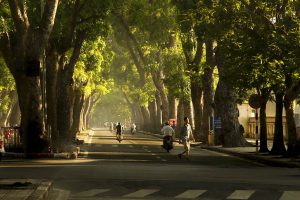
Officials in Vietnam’s traffic-choked capital Hanoi vowed yesterday to banish motorbikes by 2030 to ease environment and congestion woes, a decision that swiftly divided a city where two-wheelers are the main means of transportation.
Hanoi is famed for legions of motorbikes — sometimes stacked with entire families or overloaded with deliveries — that clog roads in a fast-growing city with limited public transportation.
There are five million motorbikes among a population of about seven million, compared to half a million cars on the road.
In a country where the average annual wage is still around US$2,200, the affordability of motorbikes makes them ubiquitous.
Yet critics have blamed the emissions-heavy motorbikes for Hanoi’s deteriorating air quality and worsening traffic congestion.
The decision to ban motorbikes by 2030 was approved by 95 out of 96 city councillors at a meeting yesterday.
Officials said the number of vehicles was growing at an “alarming” rate, according to a report on the city government’s website.
“Traffic jams and air pollution will become serious in the future if no immediate management measures are in place,” the report said.
The ban will be implemented in metropolitan districts, and public transport options would be increased to wean people off their scooters, the report added.
The number of registered motorbikes in Vietnam is among the highest in Southeast Asia, and officials in Hanoi have long-mulled banning the bikes in an effort to modernise the city along the lines of Seoul or Tokyo.
Some welcomed the move, saying the ban is crucial to cleaning up Hanoi’s air, which is notoriously smoggy in the winter months.
“Too many private cars, too many motorbikes… the quality of air is really bad and the decision made today will improve that,” economist and transport expert Luong Hoai Nam told AFP.